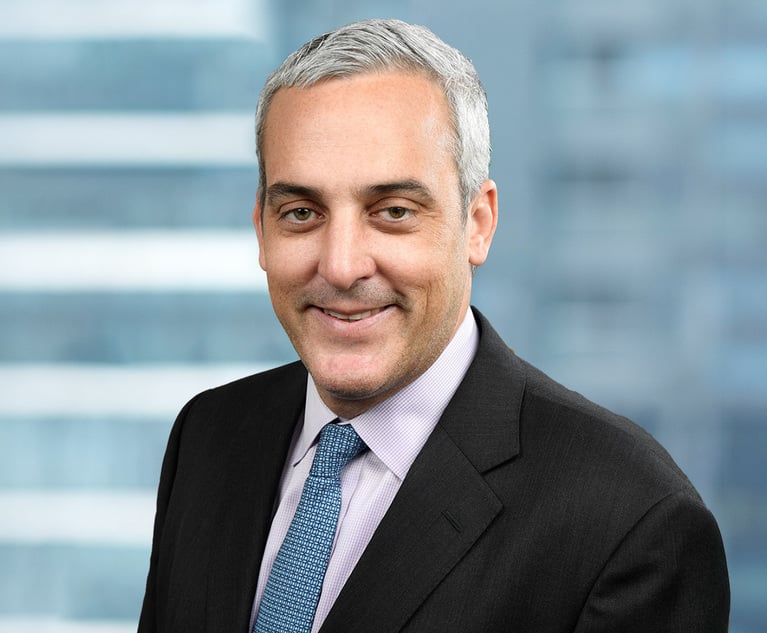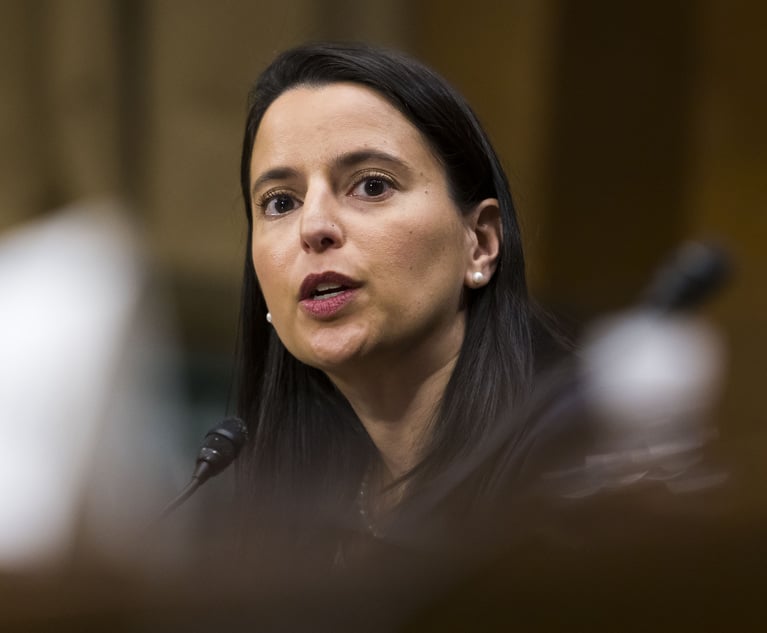Judge Warns Quarreling Lawyers in DOJ's Immigration Suit Against California
The U.S. Justice Department and the California Attorney General's Office fired off a round of arguments over scheduling and venue for the government's big immigration case against the state. U.S. District Judge John Mendez in Sacramento wasn't having it. On Monday, he told the attorneys to knock it off.
March 12, 2018 at 06:42 PM
4 minute read
 U.S. Justice Department in Washington. Credit: Mike Scarcella / ALM
U.S. Justice Department in Washington. Credit: Mike Scarcella / ALM Less than a week after U.S. Attorney General Jeff Sessions sued California to block the state's immigration sanctuary laws, the judge assigned to the case on Monday told lawyers for both sides to knock off the squabbling over scheduling.
U.S. District Judge John Mendez of the Eastern District of California issued an order Monday telling lawyers for the U.S. Justice Department and California's attorney general “not to file any further statements, responses or arguments … not specifically authorized or requested by the court.”
Mendez referred specifically to three filings—a proposed scheduling order by the Justice Department, a counterproposal by Attorney General Xavier Becerra's office and a counter-response submitted Monday by the Justice Department.
In the combined 23 pages, the public learned this much: The two sides could not agree on a briefing timeline.
The early legal spat mirrors the heated political dispute pitting the Trump administration against California's Democratic leaders. Sessions, in a speech to police officers in Sacramento last week, called Gov. Jerry Brown and other state officials “extremists” bent on creating an “open borders” policy. Brown, in turn, called the federal lawsuit a “political stunt” and accused Sessions of declaring “war” on California.
Mendez laid out his own schedule Monday. Attorneys for California have until Tuesday to file their opening brief arguing why they think the case should be transferred to the federal court in San Francisco. That's where U.S. District Judge William Orrick of the Northern District of California is hearing California's challenge to a Trump administration proposal to withhold law enforcement grants from jurisdictions that do not cooperate with federal immigration enforcement.
“It is remarkable that the state of California would seek to delay this matter primarily so that it can avoid litigating in its state capital,” DOJ lawyers said in Monday's filing. “There is no basis to seriously entertain this request that the case be transferred.”
California also wants “expedited discovery” that would explore the Justice Department's push for a preliminary injunction blocking the state's three targeted laws. Mendez told California's lawyers to take up that issue with Magistrate Judge Kendall Newman. A briefing schedule on the preliminary injunction will depend on whether Mendez grants the state's motion to move the case, he wrote.
Becerra has compiled a legal team composed of Department of Justice veterans and relative newcomers. Thomas Patterson, a senior assistant attorney general who has defended the state in prison-related litigation, was listed on the state's initial filing in the case. Also on the filing were supervising deputy attorneys general Michael Newman, director of the AG's bureau of children's justice, and Satoshi Yanai. Deputy attorneys general Christine Chuang, Anthony Hakl and Lee Sherman are also on the court team for California.
Most of the lawyers on the federal team hail from Main Justice in Washington, not the Eastern District U.S. Attorney's Office. Chad Readler, the acting assistant attorney general for DOJ's Civil Division, is listed at the top of the initial complaint. McGregor Scott, the Orrick, Herrington & Sutcliffe partner just confirmed as Sacramento's U.S. attorney, is also on the complaint.
Other members of the federal litigation team include special counsel August Flentje, a defender of the president's travel ban orders; William Peachey, director of the DOJ's Office of Immigration Litigation; Erez Reuveni, assistant director of the DOJ's Office of Immigration Litigation; and David Shelledy, Scott's Civil Division chief in Sacramento. Trial attorneys Lauren Bingham, Joseph Darrow and Joshua Press are also on the government's litigation team.
Read more:
Meet the Sacramento Judge Presiding Over DOJ's 'War' Against California
US Sues California Over Immigration Laws
Orrick Partner, Trump Pick for US Attorney, Discloses $5.7M Income, Client List
Sessions on 2nd Circuit's LGBT Ruling: Judges Must Have 'Read the New York Times'
This content has been archived. It is available through our partners, LexisNexis® and Bloomberg Law.
To view this content, please continue to their sites.
Not a Lexis Subscriber?
Subscribe Now
Not a Bloomberg Law Subscriber?
Subscribe Now
NOT FOR REPRINT
© 2025 ALM Global, LLC, All Rights Reserved. Request academic re-use from www.copyright.com. All other uses, submit a request to [email protected]. For more information visit Asset & Logo Licensing.
You Might Like
View All
Latham Adds Former Treasury Department Lawyer for Cross-Border Deal Guidance
2 minute read
Zoom Faces Intellectual Property Suit Over AI-Based Augmented Video Conferencing
3 minute readTrending Stories
- 1Public Notices/Calendars
- 2Wednesday Newspaper
- 3Decision of the Day: Qui Tam Relators Do Not Plausibly Claim Firm Avoided Tax Obligations Through Visa Applications, Circuit Finds
- 4Judicial Ethics Opinion 24-116
- 5Big Law Firms Sheppard Mullin, Morgan Lewis and Baker Botts Add Partners in Houston
Who Got The Work
J. Brugh Lower of Gibbons has entered an appearance for industrial equipment supplier Devco Corporation in a pending trademark infringement lawsuit. The suit, accusing the defendant of selling knock-off Graco products, was filed Dec. 18 in New Jersey District Court by Rivkin Radler on behalf of Graco Inc. and Graco Minnesota. The case, assigned to U.S. District Judge Zahid N. Quraishi, is 3:24-cv-11294, Graco Inc. et al v. Devco Corporation.
Who Got The Work
Rebecca Maller-Stein and Kent A. Yalowitz of Arnold & Porter Kaye Scholer have entered their appearances for Hanaco Venture Capital and its executives, Lior Prosor and David Frankel, in a pending securities lawsuit. The action, filed on Dec. 24 in New York Southern District Court by Zell, Aron & Co. on behalf of Goldeneye Advisors, accuses the defendants of negligently and fraudulently managing the plaintiff's $1 million investment. The case, assigned to U.S. District Judge Vernon S. Broderick, is 1:24-cv-09918, Goldeneye Advisors, LLC v. Hanaco Venture Capital, Ltd. et al.
Who Got The Work
Attorneys from A&O Shearman has stepped in as defense counsel for Toronto-Dominion Bank and other defendants in a pending securities class action. The suit, filed Dec. 11 in New York Southern District Court by Bleichmar Fonti & Auld, accuses the defendants of concealing the bank's 'pervasive' deficiencies in regards to its compliance with the Bank Secrecy Act and the quality of its anti-money laundering controls. The case, assigned to U.S. District Judge Arun Subramanian, is 1:24-cv-09445, Gonzalez v. The Toronto-Dominion Bank et al.
Who Got The Work
Crown Castle International, a Pennsylvania company providing shared communications infrastructure, has turned to Luke D. Wolf of Gordon Rees Scully Mansukhani to fend off a pending breach-of-contract lawsuit. The court action, filed Nov. 25 in Michigan Eastern District Court by Hooper Hathaway PC on behalf of The Town Residences LLC, accuses Crown Castle of failing to transfer approximately $30,000 in utility payments from T-Mobile in breach of a roof-top lease and assignment agreement. The case, assigned to U.S. District Judge Susan K. Declercq, is 2:24-cv-13131, The Town Residences LLC v. T-Mobile US, Inc. et al.
Who Got The Work
Wilfred P. Coronato and Daniel M. Schwartz of McCarter & English have stepped in as defense counsel to Electrolux Home Products Inc. in a pending product liability lawsuit. The court action, filed Nov. 26 in New York Eastern District Court by Poulos Lopiccolo PC and Nagel Rice LLP on behalf of David Stern, alleges that the defendant's refrigerators’ drawers and shelving repeatedly break and fall apart within months after purchase. The case, assigned to U.S. District Judge Joan M. Azrack, is 2:24-cv-08204, Stern v. Electrolux Home Products, Inc.
Featured Firms
Law Offices of Gary Martin Hays & Associates, P.C.
(470) 294-1674
Law Offices of Mark E. Salomone
(857) 444-6468
Smith & Hassler
(713) 739-1250








